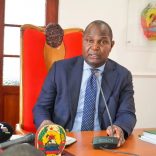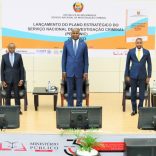Mozambique President Daniel Chapo makes a working visit to Manica province - Watch
Mozambique: Privinvest seeks to implicate Nyusi in court case – AIM report

File photo: Mer et Marine
The Abu Dhabi based group Privinvest and its Lebanese owner, the billionaire Iskandar Safa, have dragged the name of Mozambican President Filipe Nyusi into the London court case where the Mozambican Attorney General’s Office (PGR) is suing them for their role in the scandal known as the “hidden debts”.
This term refers to the loans of over two billion US dollars made in 2013 and 2014 by the banks Credit Suisse and VTB of Russia to three fraudulent Mozambican companies, Proindicus, Ematum (Mozambican Tuna Company) and MAM (Mozambique Assets Management).
The loans were only possible because the banks carried out no due diligence on the three companies, which had no business record and were effectively run by the Mozambican security service, SISE, and because the Mozambican government of the day, under the then President, Armando Guebuza, issued illegal loan guarantees, in violation of the 2013 and 2014 budget laws, and of the Mozambican constitution.
The loan guarantees were signed by the then Finance Minister Manuel Chang, who is currently languishing in South African custody, awaiting a decision as to whether he will be extradited to Mozambique or to the United States. Both countries wish to put him on trial for crimes concerning the fraudulent scheme.
Massive corruption was involved in the loans, as was admitted by the three Credit Suisse managers who negotiated them, Andrew Pearse, Detelvina Subeva, and Surjan Singh. These three people were among those charged by American prosecutors, who took a close interest in the case because the US financial system had been abused, and US investors were swindled. According to the prosecutors, at least 200 million dollars of the loan money was diverted into bribes and kickbacks.
Privinvest was closely involved in the bribery as became clear in the 2019 trial in New York of Privinvest official Jean Boustani. Privinvest was very much an interested party since it became the sole supplier to Proindicus, Ematum and MAM. An independent audit into the two companies in 2017 showed that Privinvest had vastly inflated the prices it charged for the fishing boats and other assets it supplied. This over-invoicing was estimated at around 700 million dollars.
The PGR began proceedings in London in 2019 against five companies in the Privinvest group – namely Privinvest Shipbuilding S.A.L. Abu Dhabi (Branch), Abu Dhabi Mar LLC, Privinvest Shipbuilding Investments LLC, Logistics International SAL (Offshore), and Logistics International Investments. It is also suing Credit Suisse and the three Credit Suisse officials who have admitted taking Privinvest bribes, Pearse, Subeva and Singh.
The PGR is demanding that each of those named in the suit compensate Mozambique for its losses in the corrupt scheme. It wants the court to declare null and void the government guarantee on the 622 million dollar loan arranged by Credit Suisse for ProIndicus, on the grounds that this debt, along with the rest of the loans were part of a gigantic fraud.
Privinvest is fighting back by attempting to implicate Nyusi. A lengthy court document submitted by Privinvest, and cited by the Bloomberg agency on Sunday, says that Nyusi was “at the very centre” of the matters raised by the PGR.
Privinvest admits making payments to Nyusi. The problem for Privinvest is that it will destroy its case, if it calls these payments bribes. Instead, it disguises them as “campaign contributions”.
“President Nyusi was at all material times aware of the projects, the financing thereof, and the nature of the goods and services supplied by Privinvest,” the company and Safa said in their court filings. “He requested political campaign contributions from Privinvest, met directly with Mr. Boustani in relation to those contributions and the projects more generally, and was directly involved in the conception of the projects in his then-role as minister of defense.”
In fact, it was not the Ministry of Defence that was directly involved in the three companies, but SISE, and SISE answered, not to Nyusi but to Guebuza.
This is not the first time Nyusi’s name has been mentioned in connection with the “hidden debts”. During his trial in New York, in November 2019, Boustani said that Privinvest allocated four million dollars to the Frelimo election campaign in 2014 and another two million to “NUY”. Boustani confirmed that the latter was an alias Privinvest used for Nyusi, who was then the Frelimo presidential candidate and went on to win the election.
Earlier in the trial, agents from the Federal Bureau of Investigation (FBI), told the court they had deciphered most of the nicknames and aliases used by Privinvest, but were unsure about “Nuy”, also referred to as “New Guy” or “New Man”. The FBI had also only been able to track one million of the promised two.
In its court filings, Privinvest said “Nyusi himself received and/or benefited from payments made by Privinvest, with the consequence that it is dishonest and/or misleading to now present them as bribes unless the Republic (Mozambique) is to suggest that the payments to President Nyusi were also bribes”.
The filings also admit to making “campaign contributions” of ten million dollars to the ruling Frelimo Party.
Privinvest admitted to paying Chang seven million dollars – but once again claimed these were “campaign funds”, although it is quite unheard of for individual Frelimo parliamentary candidates, such as Chang, to receive such huge sums. Some of the money was also earmarked for Chang’s future business ventures – which have never materialized.
Privinvest also claimed that Nyusi asked Chang to sign the loan guarantees. But, as Finance Minister, Chang answered to Guebuza, not to Nyusi.
In response to the Bloomberg story, Frelimo spokesperson Caifadine Manasse, said the Party had nothing to do with the hidden debts, and that Nyusi, who was not President at the time, was legally entitled to receive political donations for his campaign.
This is true, since the Mozambican law on campaign finance is very lax. The electoral law states that campaigns may be financed by Mozambican and foreign individuals, by “friendly national and foreign parties” and by national and foreign NGOs. It outlaws campaign contribution from foreign governments, and national or foreign governmental institutions and public companies. The law says nothing about foreign private companies, nor does it fix any limit to how much money foreign organisations can channel to Mozambican election campaigns.













Leave a Reply
Be the First to Comment!
You must be logged in to post a comment.
You must be logged in to post a comment.